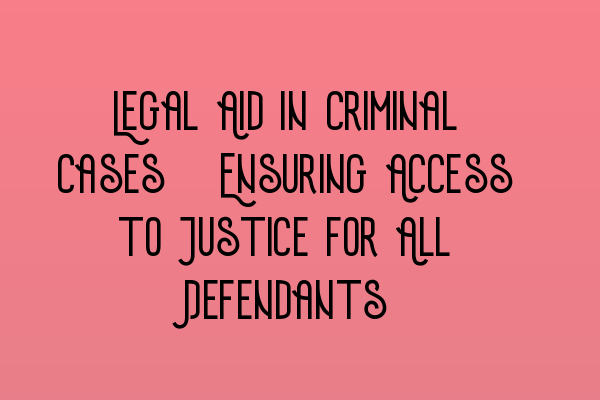Legal Aid in Criminal Cases: Ensuring Access to Justice for All Defendants
In the criminal justice system, every defendant has the right to be adequately represented by legal counsel. However, not all individuals accused of a crime have the financial means to hire a private defense attorney. This is where legal aid in criminal cases plays a crucial role in ensuring access to justice for all defendants, regardless of their financial situation.
Legal aid refers to the provision of free legal assistance to those who cannot afford to pay for legal representation. In criminal cases, legal aid is particularly important as it helps level the playing field for defendants who might otherwise be at a disadvantage due to limited resources.
Without legal aid, defendants who cannot afford an attorney would either have to represent themselves or rely on a court-appointed lawyer. While court-appointed lawyers can provide competent representation, they often face heavy caseloads and limited resources, which can hinder their ability to provide a robust defense. Therefore, legal aid ensures that defendants have access to a qualified and dedicated legal professional who can effectively advocate for their rights.
The Importance of Legal Aid in Criminal Cases
1. Demystifying the Solicitors Qualifying Examination Format
Legal aid helps uphold the principle of equality before the law. It ensures that individuals, regardless of their financial circumstances, have equal access to justice. This is crucial in criminal cases, where the consequences of a conviction can be severe, including imprisonment, fines, and a criminal record that can impact various aspects of a person’s life.
2. LLC Formation Made Simple: Step-by-Step Guide for UK Entrepreneurs
Legal aid also promotes fairness and impartiality in the criminal justice system. By providing defendants with competent legal representation, it ensures that their rights are protected and that the evidence against them is properly scrutinized. This contributes to a more balanced and reliable outcome in criminal cases.
3. Business Regulations in the UK: A Comprehensive Overview
Legal aid is particularly essential for vulnerable populations. It helps individuals from marginalized communities, those with mental health issues, and other disadvantaged groups navigate the complexities of the criminal justice system. By ensuring legal representation for these individuals, legal aid helps prevent wrongful convictions and miscarriages of justice.
Challenges and Solutions
Despite its importance, legal aid in criminal cases faces numerous challenges. In many jurisdictions, budget constraints limit the availability and quality of legal aid services. This can result in long waiting times for legal representation and a lack of resources to thoroughly investigate and prepare a defense.
Moreover, the criteria for qualifying for legal aid can be stringent, making it difficult for some individuals to access the assistance they need. This further emphasizes the need for ongoing reforms to improve the availability and effectiveness of legal aid services.
One solution to address these challenges is increased funding for legal aid programs. By allocating more resources to the provision of legal aid, governments can ensure that defendants have timely access to competent legal representation. This can help reduce the strain on court-appointed lawyers and improve the overall quality of defense services.
Furthermore, promoting awareness about legal aid and its benefits is crucial. Many individuals may not be aware of their right to legal aid or how to access it. By educating the public and providing information about available resources, we can ensure that eligible defendants take advantage of legal aid services.
Additionally, collaboration between legal professionals and organizations can help bridge the gap in access to justice. Pro bono initiatives, where lawyers provide free assistance to individuals who cannot afford legal representation, can complement existing legal aid programs and increase the pool of available resources for those in need.
Conclusion
Legal aid in criminal cases is essential for ensuring access to justice for all defendants. It plays a vital role in upholding the principles of equality, fairness, and impartiality in the criminal justice system. However, challenges such as limited funding and strict eligibility criteria need to be addressed to improve the availability and effectiveness of legal aid services.
By recognizing the importance of legal aid and working towards its enhancement, we can create a criminal justice system that truly serves all individuals, regardless of their financial circumstances.
